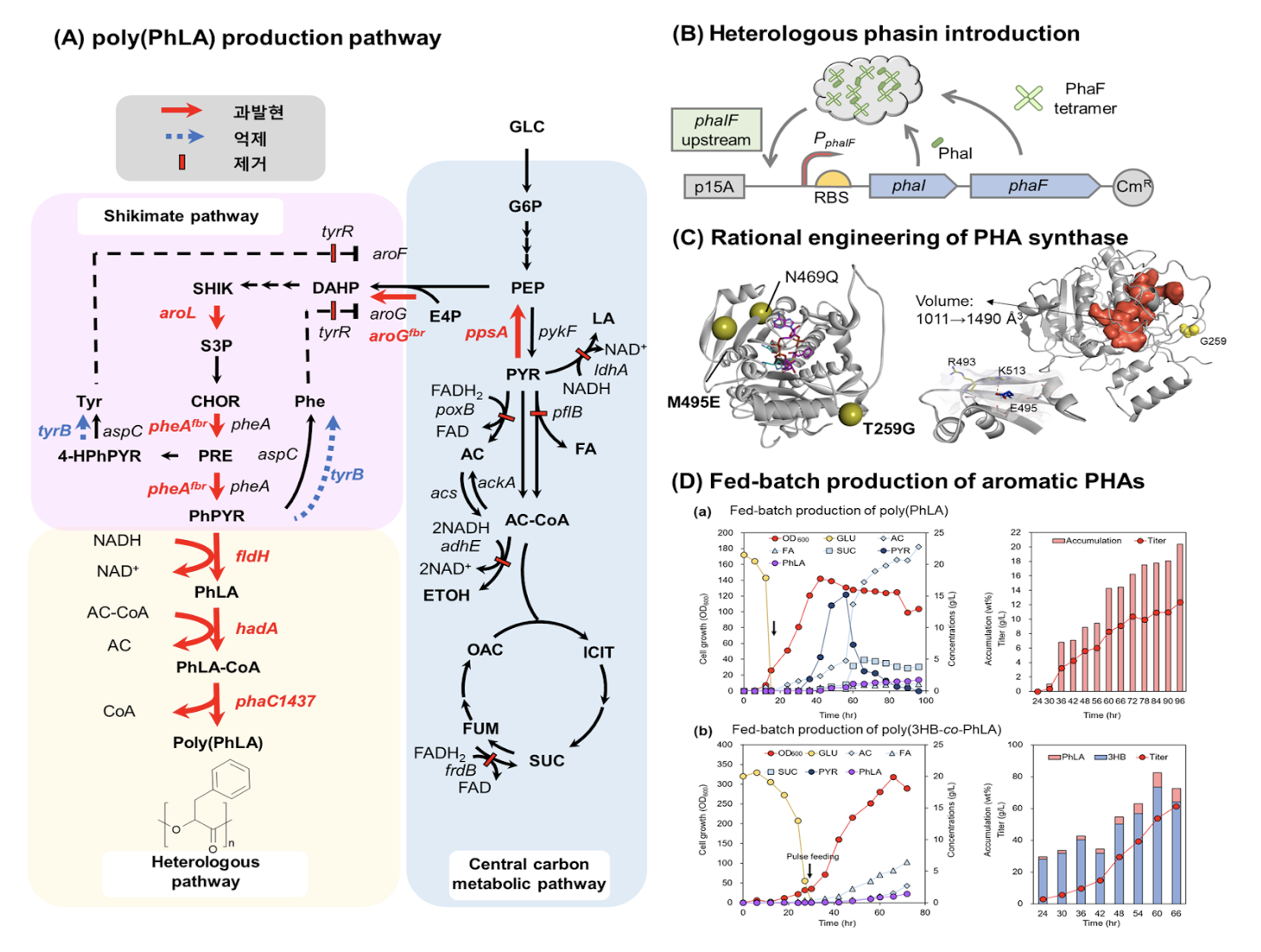The KAIST research team led by Distinguished Professor Sang Yup Lee, including Dr. Youngjoon Lee and Ms. Minju Kang from the Department of Chemical and Biomolecular Engineering, has successfully developed a microbial strain that efficiently produces aromatic polyesters using systems metabolic engineering. Various strategies were proposed to increase production and achieve the world’s highest titer of eco-friendly aromatic polyesters as potential alternatives to conventional fossil fuel-based plastics. This study was published in Trends in Biotechnology, online, on August 21, (Microbial production of an aromatic homopolyester, Trends in Biotechnology, online, 2024).
Polyhydroxyalkanoate (PHA) is a natural polyester produced by microorganisms from renewable biomass. Among various eco-friendly polymers, PHA is gaining attention for its excellent biodegradability and biocompatibility, making it suitable for diverse applications such as food packaging and medical products. However, natural PHA has limitations in terms of durability, thermal stability, and other physical properties, and its low production yields have hindered its commercial use. Recently, Sang Yup Lee’s research group garnered attention by developing an Escherichia coli strain that produces aromatic PHA to address plastic-related environmental pollution.
In this study, the researchers enhanced the metabolic flow of the biosynthetic pathway of the aromatic monomer phenyllactate (PhLA) in E. coli through metabolic engineering and manipulated the metabolic circuits to increase the fraction of accumulated polymers within the cells. The structure of PHA synthase was predicted using computer simulations and the enzyme was improved based on the correlation between structure and function.
Following optimization of fermentation, the team achieved the world’s highest titer of poly(PhLA) at 12.3±0.1 g/L and successfully scaled up to 30L fed-batch fermentation, demonstrating the potential for industrial-scale production. The produced aromatic polyesters showed promise as drug delivery carriers, as well as enhanced thermal properties and improved mechanical properties.
The research team demonstrated that the introduction of heterologous phasin proteins, proteins associated with PHA production on the surface of PHA granules, is critical in non-natural PHA production. It significantly increased the intracellular polymer accumulation ratio, which is directly linked to economic efficiency and production yield. They further refined the PHA synthase using rational enzyme engineering, predicting its three-dimensional structure via homology modeling and employing molecular docking and molecular dynamics simulations to develop enzyme variants with improved monomer polymerization efficiency.
Co-first author Dr. Youngjoon Lee stated, “This study is significant as it demonstrates the microbial production of aromatic polyesters at the highest global concentration using environmentally friendly methods and raw materials. We expect this technology will play a crucial role in solving plastic-related environmental pollution.” Distinguished Professor Sang Yup Lee added, “This study, which presents various strategies using systems metabolic engineering to produce valuable polymers efficiently, is expected to contribute significantly to addressing climate change and recent plastic pollution issues.”
This research received funding from the National Research Foundation through the “Development of Next-Generation Biorefinery Platform Technologies for Leading Bio-based Chemicals Industry” project (2022M3J5A1056072), the “Development of Platform Technologies of Microbial Cell Factories for the Next-Generation Biorefineries” project (2022M3J5A1056117), and the “Development of Platform Technology for the Production of Novel Aromatic Bioplastic Using microbial Cell Factories” project (2022M3J4A1053699) under the support of the Korean Ministry of Science and ICT.

Prof. Sang Yup Lee, Dr. Youngjoon Lee, Ms. Minju Kang Dept. of Chemical and Biomolecular Engineering, KAIST
E-mail: leesy@kaist.ac.kr
Homepage: https://mbel.kaist.ac.kr






